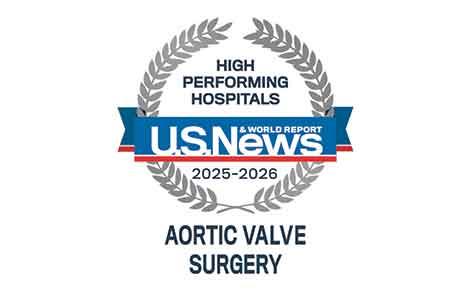Aortic Valve Replacement With Open Surgery
Make an Appointment
Chest pain, dizziness, fainting – issues with your aortic valve can make it hard to live your life. You can't do what you could before. You're worried about your future.
At UVA Health, our heart experts can answer your questions about your future. And we can make a plan of action that's right for you.
Aortic Valve Replacement With Open Surgery at UVA Health
Aortic valve replacement is an open surgery. It replaces your bad aortic valve with a new one. When you have a bad aortic valve, there's a lot less oxygen-rich blood getting out to your body.
When we replace your aortic valve, the new valve may be:
- Mechanical — Made entirely out of artificial parts.
- Bioprosthetic — Made out of a combination of artificial parts and tissues from a pig, cow, or other animal.
- Homograft or allograft — Taken from a donated human heart.
- Ross procedure (self-donated) — If you're younger than age 50, we might be able to take another one of your own heart valves and use that to replace your faulty aortic valve. Then we put in a homograft to replace the valve we moved to your aortic valve.
A Less-Stressful Option: TAVR
We also offer transcatheter aortic valve replacement (TAVR). This procedure isn't open surgery. With TAVR, you can avoid the large cuts and long recovery time you'll need with open surgery. Talk with your doctor to see if TAVR is a better option for you.

High-Performing In Aortic Valve Replacement
Aortic Valve Surgery: What to Expect
This is open-heart surgery. You'll be put on a heart-lung machine during the procedure. We'll replace your aortic valve through a cut in your chest.
How Long Does the Surgery Last?
- The entire procedure should take about 2-4 hours.
- Your hospital stay will last 5-7 days.
Why Do I Need an Aortic Valve Replacement?
You can be born with an aortic valve problem. Or you can develop disease as you age.
Causes include:
- Aortic stenosis
- Rheumatic valve disease
- Bicuspid aortic valve disease
- Endocarditis
- Aortic aneurysms